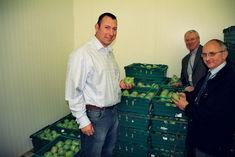
A series of storage trials evaluating the benefits of ethylene scrubbers is expected to improve overall quality and in some cases lengthen the season. The trials were completed on its grower members' farms this month by Norman Collett, the English top fruit marketing group.
The company is working with the UKCA/BRM Agencies which jointly represent the French manufacturer, Absoger. It has developed an atmosphere control system with the capacity for a single unit to control up to 400 tonnes of fruit.
Nigel Jenner, Collett's director in charge of the trials, first tried the system during the 2005-06 season in three 100t Bramley stores and one 100t Cox store.
He believes that continuing pressure from consumer groups and retailers to reduce and finally eliminate chemical storage, however harmless, provides a long term opportunity for greater use of ethylene removal.
The initial results proved so promising that the evaluation was expanded during 2006-07, doubling the Bramley volume, repeating the Cox trial and adding a single Gala store.
"Apart from being more economical than other systems there have been some impressive results," he says,
For Bramley growers, the key finding is that there is virtually no scald provided the fruit is picked on time, and there is a large reduction in rotting, particularly in senescent rots such as penicillium. Other findings included that bitter pit was reduced, fruit firmness was unaffected even after 10 months and exceptional background colour was retained.
"There are however caveats." he admited. "Superficial scald on very late picked fruit will not be controlled by the process. Sealing of stores must be delayed by 10 days to prevent carbon dioxide injury, and growers much ensure that the recommended CO2 regime is not exceeded by more than 0.5 per cent."
There was no obvious benefit on pressure with long term Cox storage, although ethylene led to the virtual elimination of rotting in fruit which is marketed in December,
The impact on Gala however, was described as ‘exceptional’, with virtually no rots and eliminating greasiness and enabling fruit conditioning.
"These factors will allow the variety to be stored longer than the current accepted season which mainly lasts until late January, simply because there is not sufficient volume to meet demand," he explained.
"However the trials have shown that a longer season is possible as Gala planting continues to expand."
A key element in the future is that Jenner believes other varieties such as Braeburn could benefit. He adds that ethylene is often more economical as well as being a viable alternative to other systems used by the industry.
Its application could also benefit Collett's growers, who are investing in a substantial planting programme covering many new varieties, including organics.
As far as cost is concerned, a single unit scrubber is priced at around £18,000, although based on comparative figures Jenner, Ken Hatch, managing director of UKCA and Brian Martin of BRM Agencies agree that it will pay for itself within three seasons
"It could be even sooner because more good marketable fruit will come out of store," they say.



